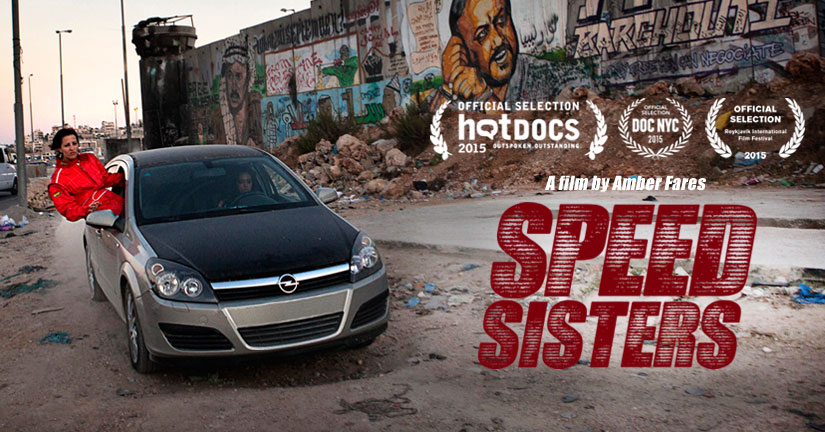Speed Sisters
Genre: Documentary
Released: 2015
Director: Amber Fares
Run time: 78 min
Platform viewed: VIMEO
Clichés: None - this film breaks the mould
My rating: Four Hartley's

It is hard to image a more difficult pathway into racing than being a female in occupied Palestine. This is the focus of ‘Speed Sisters’ which follows a four woman race team, Marah, Betty, Noor and Mona who ply their craft in a racing series through the middle east. The director of this film, Amber Fares, followed these women for four years and as a result we get a glimpse of their racing and personal worlds across two racingseasons.
To put it poetically the racing scene in Palestine is clandestine. The racing series is comprised of five, part drift, part gymkhana style racing events organised on circuits largely made from road cones in repurposed car parks. The events are competed in by anyone who can get their hands on some sort of vehicle which is stripped of excess weight and modified based on what spare components might be available. The races seem to be organised by one guy who is the Palestinian equivalent of Bernie Ecclestone, he makes the rules and his word is final. He does not go by any sort of ‘official’ rule book and surprisingly this seems to work out reasonably well. Maybe less is more when it comes to rules in racing?
Watching this film, I could not help but think of the early New Zealand racing drivers who’s racing careers started by bolting together old cars in leaky sheds and racing them on local beaches. Those racers, like Bruce McLaren, learned ways to be innovative with limited equipment, had an isolated supply chain and could get the best out of any car in less than ‘perfect’ conditions. Their circumstances helped to hone their mechanical ingenuity and racing instincts to be world leading. It’s foreseeable that the conditions these women face will have a similar impact on their racing futures.
Conflict is a theme in this film. Of course, there is the obvious back drop of the ever present military occupying the area. There is also conflict between the women, while they are considered a ‘team’ they are clearly competing for top honours at the race events and from time to time things get pretty heated. What is clear is that all the women are totally passionate about racing and see it as an escape from the heavy situations that surround them. Racing is also a potential pathway out of Palestine with the prospect of competing in races further abroad a dream they all share.
The presence of conflict becomes more apparent in a literal sense when one of the drivers, Betty, gets shot in the back by an armed patrol. She is shot while the girls are getting in some practice in the only place they can, a concrete pad close to a military compound. I am pretty sure that getting shot during a practice session is not something many, if any, top racing drivers around the world have had to contend with during their careers. This is something to keep in mind next time you hear a driver bitching on the team radio like a baby.
Another interesting aspect to this film is the supportive role that a lot of men have in their racing lives. While male dominant beliefs and attitudes are strong in parts of the middle east the film points out that not all men think this way. Some of the girls are supported by their fathers or other blokes around who lend a hand helping to prepare their cars. The promoter of the race events also seems to be well aware that the diversity of drivers is bringing in more fans to the races.
Women have been competing in racing for 123 years, yet it is impossible to find another racing series where four women are completing, on a level playing field, in the same racing series as men. In this regard racing in Palestine is a long way ahead in the equality stakes than all the racing series I regularly follow. In Palestine there is no ability to run a separate W-series, so there isn’t one. Bravo! Need I point out that the last woman to score points in Formula 1 was Lella Lombardi in 1975 and it was only ½ a point.
The other talent on display in this film is Amber Fares. As far as I can gather this is her first crack at feature length documentary, or any film for that matter. Under Fares direction the film delivers some on and off track drama while covering wide range of current human issues in Palestine. It captures the impact that conflict has on the daily lives of people, it showcases people who are truly passionate about racing and it reminds you that regardless of the situation if there are cars around people will race them. This film is pure in the sense that racing is racing regardless of where you are, what you drive or what situation you are in. To quote racing driver Savanna Little “Once your helmet is on, you're a driver. It's not about being male, it's not about being female, it's not about anything. Once the helmet's on, none of that stuff matters anymore”.
© Copyright Racing Films
